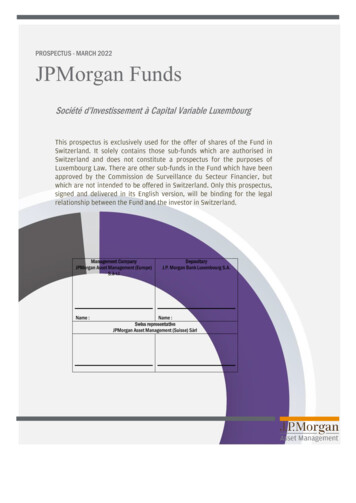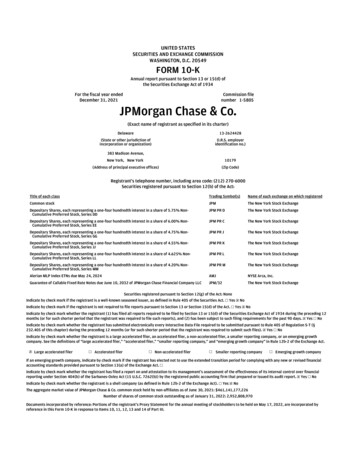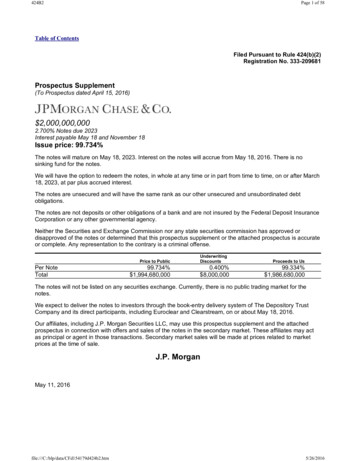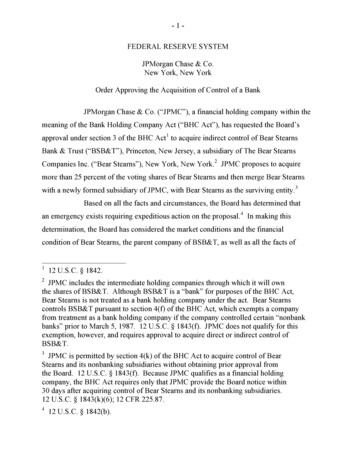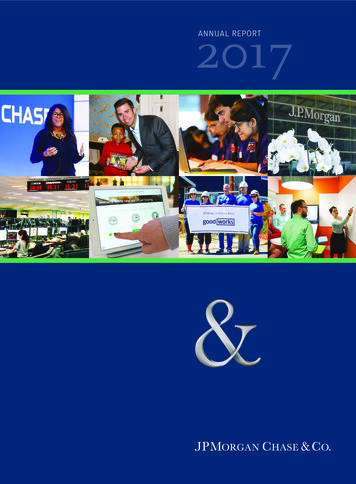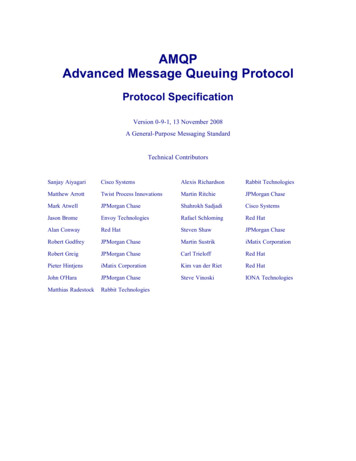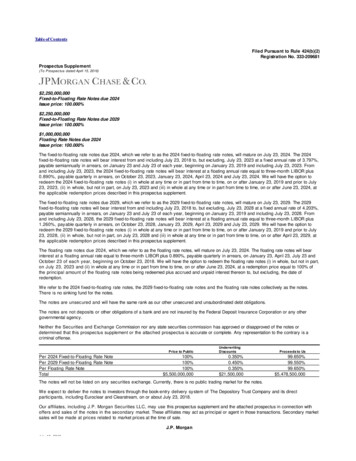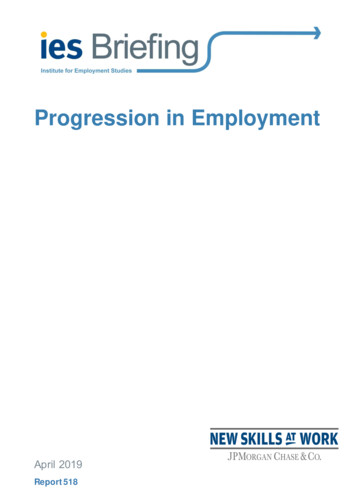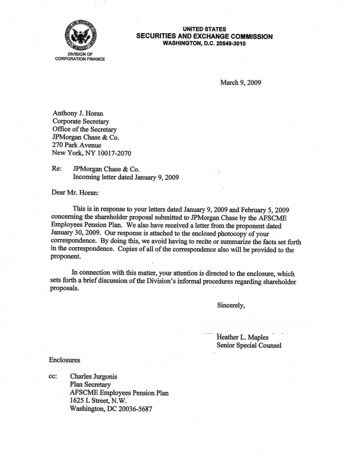
Transcription
(iUNITED STATESSECURITIES AND EXCHANGE COMMISSIONWASHINGTON, D.C. 20549-3010DIVSION OFCORPORATION FINANCEMarch 9, 2009Anthony J. HoranCorporate SecretaOffce of the SecretarJPMorgan Chase & Co.270 Park AvenueNewYork, NY 10017-2070Re: JPMorgan Chase & Co.Incoming letter dated Janua 9, 2009Dear Mr Horan:. Ths is in response to your letters dated Janua 9, 2009 and Febru 5, 2009concerng the shareholder proposal submitted to JPMorgan Chase by the AFSCMEEmployees Pension Plan. We also have received a letter from the proponent datedyourJanua 30,2009. Our response is attched to the enclosed photocopy ofcorrespondence. By doing ths, we avoid having to recite or sumarze the facts set forthin the correspondence. Copies of all of the correspondence also will be provided to theproponent.In coimection with ths matter, your attention is directed to the enclosure, whichsets fort a brief discussion of the Division's inormal procedures regardig shareholderproposals.Sincerely,Heather L.MaplesSenior. Special CounelEnclosurescc: Charles JurgonisPlan SecretaAFSCME Employees Pension Plan1625 L Street, N.W.Washigton, DC 20036-5687
March 9, 2009Response of the Offce of Chief CounselDivision of Corporation FinanceRe: JPMorgan Chase & Co.Incomig letter dated Janua 9,2009The proposal urges the Compensation & Management Development Commtteeto make specified changes to the Key Executive Performance Plan as applied to seniorexecutives.We are unable to concur in your view that JPMorgan Chase may exclude theproposal under rue 14a-8(i)(3). Accordingly, we do not believe that JPMorgan Chasemay omit the proposal from its proxy materials in reliance on rue 14a-8(i)(3).Sincerely,Julie F. BellAttorney-Adviser
DIVSION OF CORPORATION FINANCEINFORM PROCEDURES REGARDING SHAREHOLDER PROPOSALSThe Division of Corporation Finance believes that its responsibility with respect tomatters arising under Rule 14a-8 (17 CPR 240.14a-8), as with other matters under the prQxyrules, is to aid those who must comply with the rule by offering informal advice and suggestionsand to determine, initially, whether or not it may be appropriate in a paricular matter torecommend enforcement åction to the Commission. In connection with a shareholder proposalunder Rule 14a-8, the Division's staff considers the infonmition fushed to it by the Companyin support of its intention to exclude the proposals from the Company's proxy materials, as wellas any information furnished by the proponent or the proponent's representative.Although Rule 14a-8(k) does not require any communications from shareholdersto theCommission's staff, the staffwil always consider information concernng alleged violations ofthe statutes adminstered bythe Commission, including argument as to whether or not activitiesproposed to be taken would be violative of the statute or rule involved. The receipt by the staffof such information, however, should not be constred as changing the staffs informalprocedures and proxy review into a formal or adver ar procedure.It is important to note that the staffs and Commission's no-action responses toRule 14a-8(j submissions reflect only informal views. The determinations reached in these no action letters do not and canot adjudicate the meritsof a company's position with respect to theproposal. Only a court such as a U.S. District Cour can decide whether a company is obligated. to include shareholder proposals in its proxy materials Accordinglya discretionardetermination not to recommend or take Commission enforcement action, does not preclude aproponent, or any shareholder of a company, from pursuing any rights he or she may have againstthe company in cour, should the management omit the proposal from the company's proxymateriaL.
JPMÖR.GAøCHA E &CO.iièbrûar ,2009AntlôDýJ.HörañC9Jra S tmOffçèöftheSecretatJi .E.M1tQfee.ofGJhìefGøutelDivisionofCo1'or tiQn.Eiiançe ècûrties ârdIEXêhagtCommssìöÌllOOF StTe.et,'NWasmngtpn,DÇ 20549Re: Ujplementãl Letter Règätdìng.8hatehotikrProposal.ofAF8CMEEtl1pltly e' PenßiQl1 PIern, .E*chage4ct of ¡934 .Ri:lêJ4441OeatLadies andOentle:neii.:O Janin9, 20 9,.JM i-galChase ,ç(). (the"yoniPanY")siibmittç(tale11 r Ohe''No-A.çtìpnRequest') liotifyingtlestaòf'theDhdsìon ofGorpotation Fmance (the'JSta') ofthe Securties.and.Excbaiige.Comroission'tbatthe '(JInpany.intendedteon.t.freinitsPfe2CYs tementand fpnn Qf)1oxyfpf its20()9AhtiMeeting. ofS poider (col1ecdvely,the"2009 ProxyMaterials")a shareholaerproposaI. tthe"Propo'9anti'statel1entsjiistll'P rttbeJeof'siibintteGpytheAFSÇl\EiEmplpyees et1lpl1P:lal Ct1e "'Pmpoltent.'). The.J;1'ppgsaithereq ests tbttb entCöttttee changeKey. Executive.P � erewider'tothethe �aciillstfhe unpaiaportònaccprding tosusinabilityò tbe ,results'onwbichthebonuseswereba i:. . TheNtFActio.nR.equ sti dicat s0W' peliéftlf.theProposa!tîay b(éK.cIaaéa,pûrsùanftQ:Rul i4a,, (ì)(a) because,the Pi0J?saliS'impennissibly vagUeanainaefiniteSO llitobeinerent1ymisl in .S Qs q ent1y; QIlJap 31), ØØ9, .th PropqnentElbinitte dal rtotheStaffiriwhich itdis e sWItl1le fiethe'term ."šenior. le"fÌroponeAt'sRespOllse"). atEXbit A. W'eWtte .slppíeJ: tayta rêspõnd to the Propöneìit'šltøsponsê.Mar. .12,. . . . . ThePrQPPl1ètltcItêsA:vqya Inc.(â-v . Oêt.18 2t)OôJ ârdThe Æ1JISCot¡. (avail20ø.8) fortheprop.osition that tbeStahas declinec,tocol1Cur .withthepQsitiQn.tatfa,lwct.oanddeflii thØtê1'."stnioref'e tltî'veS"reiaersashåie ()ltterI'l'ØP9 a1 iiipètiss bly vageindefinite so .asto beexcludiblel1der.R'ule14a S(ì)(4). Boweyer,thesecases aie
o.ft.c.e.of'0.'.'e.f.Counel. Ch.".:. .IJyísíóri ÔfO()I'tátiQiïFiiáIceFthruar5, 20Q9Page dístgujshâble:ñ:QmJlieintat ase beuse:the:cømpanøs.:in Awi,aln.c; andthø AES (¡Zor,.fail dtó ",pl nWhy;theitmi "Semóféxetütivt 'Was dva.glJ .ana1'i IØådìng. .It. .7:e4JS(Jorp"theëøniy:st ltedihHheprøpsâl diduot"definewñatatseniorßxecutive' is otwhielieK rlYes()fthe:GØn:p YW()ÛdQeintliicl :wit1tbe: C9P ()f' ellQrexecgtYes,'"withoutptovidIianyadditiona .imotmatìòhas towii,thsrenderedthèptoPQsâlvague andind fini .In f'vqyalnc." the cømpR- prpvid ;fol.âlte Ye:4efIItio . o:fthe 'rer:' stmorexecuûyes" butdìdiïôt exPlain wllythes Wer Í'e sôiialéintem tî()1l. Iii.contr l óllNo"Acti()u equestprQvid s.aJistQt;iterratiYe.mt l'retations of,the.tenn."seniot.executives �blè, () tïtingW1iyjtJs likeiYUitsli 1'o14erS cpti4iite tthe.dteii "senior .execlltives"'ll1'adiffe Í)lfnamer.tr()meahøtheratdlòtthêC01tpany 8p çmçrAy.sever31 f Gt91's'uni l1eto.tfe. COtnPanY.anth 14oPQs;i.render tbe.tenn"senior execu.ûv¡e 'su.ctl:ptÍbletoniU1tîplëreâ :Ønable ìntet;eta:tiøll; iÌçlu,digj1) 11ere:arat leasttheedisûnctgroüpsòfexecuû,VèS whôcoUldpòtêiltiållybeGo.nsîael'!fd. senipr.e)(eçut ves.'.l?ase4.()11.tle QOUlpany's4ØO ll()xy .Staei:Mt:the ExecutivêCommttee.theQpetäting:Cotntteé ãndthé ïieùe:xecutivèqftçers;. MørêQver; '4 ribec1jntheN()".Ax tiM:Reql1e.st;the Qøtnpany?s2.QQ8Pt()xy tâtèment pific31ly identífiêdtleEKet¡ûti eanci. ØpèratìgCQmmitte tøbe.theCøinpany"s "semørex utive ". at.d gtp.differêntigt l1PS .ofex cutiVéswhocouId1'äSÌlåbi øxy.stat ellts for the.Yeax ri()rtoreceivigtheprQPQsás,.te ctìvely.ñitØí.ttas4Rçith r Ayãyä,Inc. n(jrTleAEStegad,.A.vaya, lne. . didn tWìeth¡e.tet-"Sent(jrexecutjves" in its2()n Pro*y':Statement,and The.AES CoI'; useii/thetenn'''semorëXecutives''in itsInths2()(j7.:ProXý. tåt mentbut 4idIiõt aØfit tl temi.2) The.Pt()Pôti Ïlt1sstlpQttmg .štatëmentreÎers.t()the' nâi d exeCûûvëôf'tel's/'sllg estjRth t"se.()re1(ecitive " isintended.tømea 1jgstatemëritSm Avaya rtiP. ald'1ne4ES Çorp ø-()1listentl)'.used1heteii. seniørexeøu;tiv:es/'3) l'eCQmpliy' ji Key etutvePerlQ1'aiG RIM,. wl(çb.the:pt9P() seeK:st(.a.éiid wáSestablishedso tlätcêríifõ.ts ofcompènSátioilforã sp.eeiñcg;ôup()rexeçtlti'Vegffçer a,separte.grnup.n-oUl.tleExeci:nYe.and.ø.perig ,C()l'i êš áIdtlttian d êXê(l'Yiiveoffcers-wt)lÛd be Revenue.CødeofI986. 'rhis oupofexeeutiye(1I-cet .Ø(l.d th rêf9rer ongöIYhecøl1sidei-4; "sè i te ecllve)S:". I.nl ()thAvayalnc.ardPke)1ESCorp;, theptoposals'didnot identifyapârculárplantoWlieli.tIeprnposals wPlÙdB-PPIY.Insmnai, theAvâyâlnê; andTli AES Carp. caStsare dìStgush blefrônitlejnstçasebecau.seth ydidno.t eKplai.whythe:faiureto provide a.CIfiûonfot,tsenÍorexeßuthres?'r ttdeted.thepl'()Pôsal .vagiean4 itsI alirig. Th StaMs te4;thøtìtWill. "conell .ìithe:coin-panysreliance. orrmle,.14á.,8(t)(3.'J toexcltitleoÏ'ïfödi; äp:opošål'òtstátenerit ôm;ywhere2
Q ñc ()fQ1' fGølls(:iDiv.'.iSionofC.otpqráônFinànceF pniar , 2Q09. .Fåg tlat n:p Y.liåS.,deni()l1 tra .QbJêètì:vely.tht.tllt.PtøpQ Øl'øÍ'. tät nient.j m(gerlÇlityfa e'.()1'.mìsleadg.' S.ëe'.StaLegå1Bunëtin.NQ.i4J (S pt. ISr2Ot)4). Asdiscussedab:öve"and.ìn the"N() AcfoJlR qn st,theterm. ' s niQr X(:tntiYësi'j.o.the . røpp aIis n çeRtibl t().mnlnpleinterpretationS,eacli ofwhich.would.be;teaSonable,fot shateholders töässumewhen.teaûmg:the rQp.osa. '111,1 ;' tb.e.Pr.(J)n: nt's;faiil:'to.defie this:t rm.i' nders.the. PropQsm.jnlerGlQy.vagn. ârd ittsIØa ìIig. .ThePtopönent'sRespon ea1so. tatesthttheCompanY' anal sis' contíaàctsthef?visì n so'W arculationnfits approachtQtleQrdî business e Ciqsi()Il.;'1'ecrrQPQiieutcjtestle fapttnât tne.Staf tletei-"sen()r ecutiY "inSta ga113 lèti N(). 145\(July i2;.'40Ö ); tlolltproviditg.adetìt)itio .andditigusbet d mø:r.e ecut.y.es"frøtteínpiQyesWit1 at tQtheOl'dinabusUitlssc:xelij iQl, . Fløwevei th S't :failll tø døfe' seni()f'execütvës'- mt1scorrextdoe's.nôt mdiCátethatthetemi'smeanngis clearòttliât th. tçrihasÆlPiilieatiQIL . ather)th fajlll todeije"senìnr ex lltives"is r f1eçtiveofuiverSa1theÆaCt'tlcittIle .tleteiminiitiOÏi 'of"seniotexêciíy s".is tIp y-sPêeìfìe.Whíl 'theten"seJlQl'e ecutives?'. elearly.tloe notìncllltle.Rçøinpany:sra"aid.tlle'e11piø e s thedistinction the tãflnade in StaffLegål Btiletin 141\ intle cOIltèXt(jfthenrdibusihess.exclllsiøn-e.ptecise. toüp.ØfØ)êcUtive.øfñtstø. çónil'åty.Fòtlhc.reâòrisetförtabóvê: anai,iitheNó-AêtiØll.ReaUëst,the(;ømpany elievesthãttheP-øiiøsairnay beê!Xclnded.fiøin the.2009'Proxy Ma;teriâls:pursu:ttolluie14a--8(i)(3).p1 i¡arttQRûle 14 k (jJ,;we lia çql1c ;r ntlyseiltacøpy of thisêôl'êspOiidenceto theProponent. WewoiiId heqi¡estiøns,thtyou,mayâný:additiotnil. haveregardig thìssubj tt Ifwecan b øfany'fier 'assistmçeÎ1'tbstrattêr please dl;IWthesitatetQcállIIèaf(112:)270"7122or AmY L OOØdi6fGihsp*, Øu&. CrutcherLLP .át(202)9' , ;8653.( Sinèèrèly,AnthOfiyJ.,HbtaI)3ncløs.u.es.cC:Any. .Ç1ØQdni (rl s Il".:()un.,8tCÎ'tab t.LLrJurgonis, AFSCME.ErployeesPensìonPl CharlesGtlrâl4w. lØcEntee, t\SCMEîEniPløY s ensioiiPla.t!) 9\S193,P()C3
%AFSCMEWe Make America HappenEMPLOYEES PENSION PLANCommitteeGerald W. McEnteeWiliam LucyJanuar 30, 2009Edward l. KellerKathy l. SackmanHenry C. ScheffVIA ELECTRONIC MASecurities and Exchange CommissionDivision of Corporation FinanceOffce of Chief Counsel100 P Street, NEWashigton, DC 20549Re: Shareholder proposal of AFSCME Employees Pension Plan; request by JPMorganChase & Co. for no-action determnationDear Sir/Madam:Pursuant to Rule 14a-8 under the Securties Exchange Act of 1934, the AmericanFederation of State, County and Muncipal Employees, Employees Pension Plan (the "Plan")submitted to JPMorgan Chase & Co. ("JPMC" or the "Company") a shareholder proposal(the "Proposal") urging the board's Compensation & Management Development Committee(the "Committee") to change the Company's anual incentive plan, the Key ExecutivePerformance Plan ("KEPP"), to defer some portion ofbonuses awarded thereunder to JPMC .senior executives and to adjust the unpaid portion, if necessar, based on the quality andsustainability of the results on which the bonuses were based.In a letter dated Januar 9, 2009, JPMC stated that it intends to omit the Proposalfrom its proxy materials being prepared for the 2009 anual meeting of shareholders. JPMCargues that it should be allowed to exclude the Proposal in reliance on Rule 14a-8(i)(3)because it is impermissibly vague and indefinite. As discussed below in more detail, theProposal defines important terms such that both shareholders and the Company know whatactions would need to be taken in order to implement the Proposal; accordingly, JPMC'srequest should be denied.Rule 14a-8(i)(3) allows a company to omit a proposal that violates any of theCommssion's other proxy rules, including Rule 14a-9's prohibition on false or misleadingstatements. The Staff of the Division of Corporation Pinance have interpreted ths exclusionas allowing omission of a proposal that is impermissibly vague and indefinte.JPMC's 0 bj ection centers on the application of the Proposal to "senior executives" ofthe Company. This term, JPMC asserts, could have multiple meanngs, makg it impossiblefor JPMC to know how to implement the Proposal and confsing shareholders about whatadoption of the Proposal would entaiL. 21383107American Federation of State, County and Municipal Employees, AFL-CiaTEL (202) 775.8142 FAX (202) 785-4606 1625 L Street, N.W., Washington, D.C. 20036-5687
Securties and Exchange CommissionJanuar 30, 2009Page 2JPMC cites numerous determinations allowing exclusion based on the failure to defineterms including "executive," "Industr Peer Group," "compensation," "officers and directorsresponsible for" a reduced stock dividend, "perks," "benefits" and "average wage." JPMCdoes not point to a single determination, however, in which the failure to define the term ."senior executive" was the basis for exclusion on Rule 14a-8(i)(3) grounds.In fact, JPMC' s precise argument has recently been rejected by the Staff. For example,in Avaya Inc. (available October 18,2006) and The AES Corporation (available March 12,2008), the proposals (which were substantially identical) sought the adoption of a "pay-foi: superior-performance" standard for "senior executive" compensation. A vaya and AES arguedthat the term "senior executive," on which the proposal did not elaborate, was too vague,justifYing exclusion of the proposal. Like JPMC, A vaya listed four different possible"senior executive," ranging from only the named executive offcers to section16 reporting offcers to all individuals with the title of vice president or higher. The Staffdeclined to concur with A vaya and AES' s positions.interpretations ofThe use of the term "senior executive" is unavoidable when drafing proposals dealingwith executive compensation. Under the Division's interpretation of Rule 14a-8(i)(7)'sordinar business exclusion, a proposal must relate solely to "senior executive" compensationin order to avoid exclusion on ordinar business grounds. In Staff Legal Bulletin 14A, theStaff explained the distinction it employs:Since 1992, we have applied a bright-line analysis to proposals concerng equity orcash compensation:· We agree with the view of companies that they may exclude proposals thatrelate to general employee compensation matters in reliance on rule 14a 8(i)(7); and· We do not agree with the view of companies that they may excludeproposals that concern only senior executive and director compensation in .reliance on rue 14a-8(i)(7).(StaffNeither StaffLegal Bulletin 14A (July 12,2002) (footnotes omitted))Legal Bulletin 14A nor any ofthe Division's determinations defines the term"senior executive."the Proposal is excessivelyvague and indefinite becauseit does not define the term "senior executive" fles in the face of recent Staff determinations. ItIn sum, JPMC's arguent thatalso contradicts the Division's own ariculation of its approach to the ordinar businessexclusion in StaffLegal Bulletin 14A. Accordingly, JPMC's request for relief should not begranted.* * * *
Securities and Exchange CommissionJanuar 30, 2009Page 3If you have any questions or need additional information, please do not hesitate tocall me at (202) 429-1007. The Plan appreciates the opportty to be of assistance to theStaf in this matter.Very trly yours,CJ :temcc: Anthony J. HoranCorporate SecretarJPMorgan Chase & Co.Fax # 212-270-4240EmaIl: ANTHONY.HORAN chase.com1
JPMORGA:\, CHASE &Co.Anthony J. HoranCorporate SecretaryOffice of the secretaryJanuary 9, 2009VIAE-MAILOffice of Chief CounselDivision of Corporation FinanceSecurities and Exchange Commission100 F Street, NEWashington, OC 20549Re:Shareholder Proposal ofAFSCME Employees Pension PlanExchange Act of /934-Rule 140-8Dear Ladies and Gentlemen:This lener is to inform you that JPMorgan Chase & Co. (the "Company") intends to omitfrom its proxy statement and fonn of proxy for its 2009 Annual Meeting of Shareholders(collectively, the "2009 Proxy Materials") a shareholder proposal (the "Proposal") andstatements in support thereof received from the AFSCME Employees Pension Plan (the··Proponent'').Pursuant to Rule 14a-80), we have: filed this letter with the Securities and Exchange Commission (the"Commission") no later than eighty (80) calendar days before the Companyintends to file its definitive 2009 Proxy Materials with the Commission; and concurrently sent copies of this correspondence to the Proponent.Rule 14a-8(k) and Staff Legal Bulletin No. 140 (Nov. 7,2008) ("SLB 140") provide thatshareholder proponents are required to send companies a copy of any correspondence that theproponents elect to submit to the Commission or the staff of the Division of Corporation Finance(the '·Starr"). Accordingly, we are taking this opportunity to inform the Proponent that if theProponent elects to submit additional correspondence to the Commission or the Staff withrespect to this Proposal, a copy of that correspondence should concurrently be furnished to theundersigned 011 behalf of the Company pursuant to Rule 14a-8(k) and SLB 14D.270 Park Avenue, New York, New York 10011-2070Telephone 212270 7122 Facsimile 212 270 4140 anlhony.hora LOlT1JPMorgan Chase & Co.
Office of Chief CounselDivision of Corporation FinanceJanuary 9, 2009Page 2THE PROPOSALThe Proposal states:RESOLVED that shareholders of JPMorgan Chase & Co. ("JPM") urge theCompensation & Management Development Committee (the "Committee") tomake the following changes to the Key Executive Perfonnance Plan ("KEPP") asapplied to senior executives, in order to promote a longer-term perspective:I.An award to a senior executive under the KEPP (a "Bonus") that is basedon one or more financial measurements (each, a "Financial Metric")whose performance measurement period ("PMP") is one year or shortershall not be paid in full for a period of three years (the "Deferral Period")following the end of the PMP;2.The Committee shall develop a methodology for (a) determining whatproportion ofa Bonus should be paid immediately, (b) adjusting theremainder of the Bonus over the Deferral Period to reflect perfonnance onthe Financial Metric(s) during the Deferral Period and (c) paying out theremainder of the Bonus, adjusted ifrequired, during and at the end of theDeferral Period; and3.The adjustment described in 2(b) should not require achievement of newperformance goals but should focus on the quality and sustainability ofperformance on the Financial Metric(s) during the Deferral Period.The policy should be implemented in a way that does not violate any existingcontractual obligation of JPM or the terms of any compensation or benefit plancurrently in effect.A copy of the Proposal, as well as related correspondence with the Proponent, is attachedto this letter as Exhibit A.BASIS FOR EXCLUSIONWe hereby respectfully request that the Staff concur in our view that the Proposal may beexcluded from the 2009 Proxy Materials pursuant to Rule 14a-8(iX3) because the Proposal isimpermissibly vague and indefinite so as to be inherently misleading.
Office of Chief CounselDivision of Corporation FinanceJanuary 9, 2009Page 3ANALYSISI.The Proposal May Be Excluded uuder Rule 14a-8(1)(3) Beeause the Proposal IsImpermissibly Vague and Indefinite so as to Be Inherently Misleading.Rule 14a-8(iX3) permits the exclusion ofa shareholder proposal if the proposal orsupporting statement is contrary to any of the Commission's proxy rules or regulations, includingRule 14a-9, which prohibits materially false or misleading statements in proxy solicitingmaterials. For the reasons discussed below, the Proposal is so vague and indefmite as to bemisleading and, therefore, is excludable under Rule 14a-8(i)(3).The Staff consistently has taken the position that vague and indefinite shareholderproposals are inherently misleading and therefore excludable under Rule 14a-8(i)(3) becauseshareholders cannot make an informed decision on the merits of a proposal without at leastknowing what they are voting on. See Staff Legal Bulletin No. 14B (Sept. 15, 2004)("SLB 148") (noting that "neither the stockholders voting on the proposal, nor the company inimplementing the proposal (if adopted), would be able to determine with any reasonablecertainty exactly what actions or measures the proposal requires"); see also Dyer v. SEC,287 F.2d 773, 78\ (8th C1r. \961) ("[I]t appears to us that the proposal, as drafted and submittedto the company, is so vague and indefinite as to make it impossible for either the board ofdirectors or the stockholders at large to comprehend precisely what the proposal would entail.").Moreover, the Staff has concurred, on numerous occasions, that a shareholder proposalwas sufficiently misleading so as to justify its exclusion where a company and its shareholdersmight interpret the proposal differently, such that "any action ultimately taken by the [c]ompanyupon the implementation of the proposal could be significantly different from the actionsenvisioned by shareholders voting on the proposal." Fuqua IndUSTries, Inc. (avail.Mar. 12, 1991); see also Bank ojAmerica Corp. (avail. June 18, 2007) (concurring with theexclusion of a shareholder proposal in reliance on Rule 14a-8(i)(3) calling for the board ofdirectors to compile a report "concerning the thinking of the Directors concerning representativepayees" as "vague and indefinite"); Fugef Energy, Inc. (avail. Mar. 7,2002) (pennittingexclusion of a proposal requesting that the company's board of directors "take the necessarysteps to implement a policy of improved corporate governance").In the instant case, the Proposal is so vague and indefinite as to be misleading because itfails to define a key tenn or otherwise provide guidance as to how the proposal is to beimplemented such that neither the shareholders nor the Company can detennine exactly whatmeasures the Proposal requires. The Proposal requests that the Company make specified"changes to the Key Executive Perfonnance Plan ("KEPP") as applied to senior executives."However, the operative language of the Proposal fails to define the tenn "senior executives" orotherwise provide guidance as to the tenn's meaning. Similarly, the Proposal's supportingstatement fails to provide a definition. In addition, the Key Executive Perfonnance Plan (the"KEPP''), attached hereto as Exhibit B, makes no reference to the tenn "senior executives," anddefines a plan participant as any employee designated by the committee as eligible to receive anaward. As a result, it is unclear to whom the Proposal would apply, and any attempt tocomprehend the Proposal results in at least four reasonable interpretations of "senior executives";
Office of Chief COWlse)Division of Corporation FinanceJanuary 9, 2009Page 4 Interpretation 1: "senior executives" means all members of the Company'sExecutive Committee; Interpretation 2: "senior executives" means only members of the Company'sOperating Committee; Interpretation 3: "senior executives" means the Company's named executiveofficers (''NEOs''); or Interpretation 4: "senior executives" means the Company's chief executiveofficer and the three other most highly compensated officers who are NEOs otherthan the chief financial officer.Interpretation 1 would require all members of the Company's Executive Committee to be subjectto the Proposal. The Company's Executive Committee, as described on page 13 of its 2008Proxy Statement in the Compensation Discussion and Analysis ("CD&A"), attached hereto asExhibit C, is "a management committee of 48 senior executives." Interpretation 1 is areasonable interpretation of the meaning of "senior executives" because, as disclosed to theCompany's shareholders in the CD&A, the Executive Committee is composed of "seniorexecutives." Interpretation 2 would require all members of the Company's Operating Committeeto be subject to the Proposal. The Company's Operating Committee, as described on page 9 ofits 2008 Proxy Statement in the CD&A, attached hereto as Exhibit C, is the Company's "mostsenior management committee" and includes the "executive officers" of the Company, meaningthe Company's chief executive officer, the chief executive officers of the Company's six majorbusinesses, and the heads of principal functional areas. This group currently consists of 15individuals. Interpretation 2 is a reasonable interpretation oftbe meaning of "senior executives"because the Operating Committee is composed of "senior management." Moreover, while theProposal is silent as to how senior an executive must be to qualify as a "senior executive,"members of the Operating Committee are more directly responsible than members of theExecutive Committee for "promot[ing] the creation of sustainable value" - a priority for theProponent according the Proposal's supporting statement. Interpretation 3 would require onlythe Company's NEOs to be subject to the Proposal. The NEOs are the group of employeeswhose compensation is required to be disclosed in the Company's proxy statement - currently agroup oHive individuals, including the Company's chief executive officer, chief financialofficer, CEO of Asset Management, and both co-CEOs of the Investment Bank. Interpretation 3is a reasonable interpretation of "senior executives" because the Proponent, in the Proposal'ssupporting statement, makes reference to the 2007 bonuses of the "named executive officers."This suggests that the Proponent may have intended the term "senior executives" to mean theNEOs. Interpretation 4 is a reasonable interpretation of "senior executives" because the KEPPwas adopted in response to the provisions of Section I62(m) of the Internal Revenue Code,which has the effect, except as modified by the Emergency Economic Stabilization Act of2008,of generally eliminating a federal income tax deduction for annual compensation in excess of 1,000,000 paid to applicable officers unless that compensation meets the standards of Section162(m). The limitations of Section 162(m) apply to the Company's chief executive officer and
Office of Chief CounselDivision of Corporation FinanceJanuary 9, 2009PageSto the three other most highly compensated executive officers who are NEOs, other than thechief financial officer. See [oterna) Revenue Service Notice 2007-49.These various interpretations result in significant differences in the individuals coveredby the Proposal. Thus, neither the shareholders in voting on the Proposal nor the Company inimplementing the Proposal can determine precisely what the Proposal requires, and theCompany's implementation of the Proposal could be different from what the shareholders votingon the Proposal envisioned.Moreover, apart from the ambiguity of which executives are covered by the Proposal, theProposal is unclear as to the determination date for deciding who is covered by the Proposal. Forexample, does an individual have to be a "senior executive" as of the date the award is granted inorder for the requested amendments to the KEPP to be applicable or would an individual whobecomes a "senior executive" after the date the award is granted but before the date the award ispaid be covered by the Proposal? Similarly, would an individual who was a "senior executive"as of the date the award is granted but is not a "senior executive" as of the date the award is paidbe covered?Staff precedent permits the exclusion of proposals as vague and indefinite where it isunclear to whom the proposal would apply. In this regard, the Staff permitted the exclusion ofashareholder proposal requesting "'that the officers and directors responsible for . [the reducedstock dividend] . have their pay reduced" as vague and indefinite because the identity of theaffected executives was susceptible to multiple interpretations as the proponent failed to provideany guidance as to how the proposal was to be implemented. International Business MachinesCorp. (avail. Feb. 2. 2005). The Staff also has permitted the exclusion ofa shareholder proposalrequesting that future executive salary be limited as vague as indefinite because, among otherreasons, it was unclear who would be considered an "executive" for purposes of the proposal.Otter Tail Corp. (avail. Jan. 12,2004). Similar to International Business Machines Corp. andOfter Tail Corp., it is unclear to whom the Proposal would apply because the Proponent fails toprovide any guidance as to the meaning of "senior executives,"Furthermore, the Staff has permitted the exclusion of several proposals related toexecutive compensation under Rule 14a-8(0(3) as vague and indefinite because they failed todefme other key terms or provide guidance as to how the proposal was to be implemented. SeeVerizon Communications Inc, (avail. Feb. 21.2008) (concurring with the exclusion of a proposalseeking the adoption ofa "new policy for the c
JPMorgan Chase & Co. 270 Park Avenue New York, NY 10017-2070 Re: JPMorgan Chase & Co. Incoming letter dated Janua 9, 2009 Dear Mr Horan:. Ths is in response to your letters dated Janua 9, 2009 and Febru 5, 2009 concerng the shareholder proposal submitted to JPMorgan Chase by the AFSCME Employees Pension Plan.
